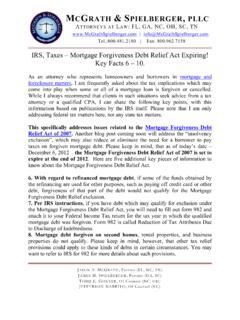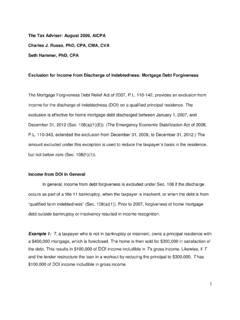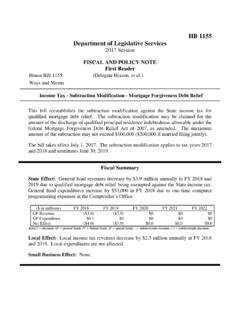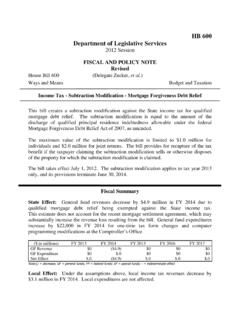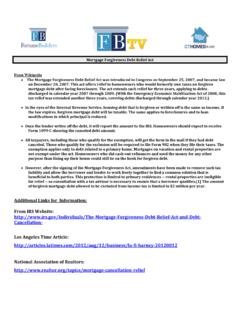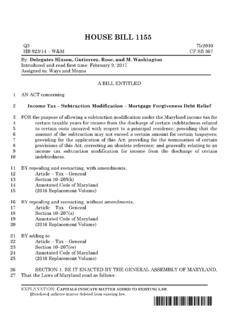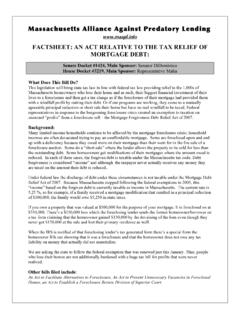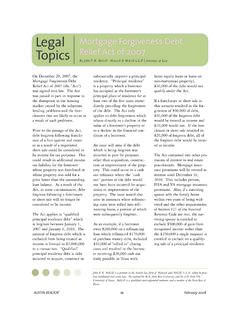Transcription of FORGIVEN MORTGAGE DEBT RELIEF IN THE - FACPA.com
1 January 7, 2008 Page 1 of 2 FORGIVEN MORTGAGE debt RELIEF IN THE MORTGAGE forgiveness debt RELIEF ACT OF 2007 Addressing the subprime lending crisis, Congress recently passed and the President signedinto law a new measure giving tax breaks to homeowners who have MORTGAGE debt preexisting law, the debt FORGIVEN by a lender, such as for short sales and refinances,was generally taxable to the borrower as debt discharge income. With the passage of theMortgage forgiveness debt RELIEF Act of 2007, a taxpayer does not have to pay Federal incometax on up to $2 million of debt FORGIVEN for a loan secured by a qualified principal change in the tax law applies to debts discharged from January 1, 2007, to December 31,2009. Please keep in mind that this is only a summary of this important tax RELIEF provision.#Discharge of indebtedness income: background. For income tax purposes, a discharge of indebtedness - that is, a forgiveness ofdebt - is generally treated as giving rise to income that's includible in grossincome.
2 However, a discharge of indebtedness doesn't give rise to gross incomeif it: (1) occurs in a Title 11 bankruptcy case, (2) occurs when the taxpayer isinsolvent, (3) is a discharge of qualified farm indebtedness, or (4) is a discharge ofqualified real property business indebtedness. Under pre-2007 MORTGAGE RELIEF Act law, there were no special rules applicable todischarges of acquisition debt on the taxpayer's principal residence. For example,assume a taxpayer who isn't in bankruptcy and isn't insolvent owns a principalresidence subject to a $200,000 MORTGAGE debt for which the taxpayer haspersonal liability. The creditor forecloses and the home is sold for $180,000 insatisfaction of the debt . Under pre-2007 MORTGAGE RELIEF Act law, the debtor had$20,000 of debt discharge income. The result was the same if the creditorrestructured the loan and reduced the principal amount to $180,000. #New law RELIEF provision.
3 The 2007 MORTGAGE RELIEF Act excludes from a taxpayer's gross income anydischarge of indebtedness income by reason of a discharge (in whole or in part)of qualified principal residence indebtedness before January 1, 2010. Theexclusion applies where taxpayers restructure their acquisition debt on a principalresidence or lose their principal residence in a foreclosure. For example, assumethe same facts as in the example above except that the discharge occurs in the 2007 MORTGAGE RELIEF Act, the debtor has no debt discharge incomewhen the creditor (1) restructures the loan and reduces the principal amount to$180,000 or (2) forecloses with the result that the $200,000 debt is satisfied for$180,000. Here is some of the critical fine print in this new RELIEF provision: !The tax RELIEF applies to the original purchase price, plus improvements, of thetaxpayer's principal residence. It doesn't apply to discharges of secondmortgages or home equity loans, unless the loan proceeds were used toJanuary 7, 2008 Page 2 of 2acquire, construct or substantially improve the taxpayer's principal indebtedness qualifies to the extent it doesn't exceed the amountof indebtedness being refinanced.
4 (Cash out from refinancing doesn't qualifyfor the exclusion.) !The indebtedness must be incurred with respect to the taxpayer's principalresidence only. The exclusion rule doesn't apply to second homes, vacationhomes, business property or investment property, since these propertiesaren't the taxpayer's principal residence. !The RELIEF provision is not a permanent fixture of the tax code. It only appliesto forgiveness during 2007, 2008 or 2009. !Nontaxable FORGIVEN MORTGAGE debt is capped at $2 million ($1 million formarried individuals filing separately). !When the RELIEF provision applies, the basis of the individual's principalresidence is reduced by the amount excluded from income. As a result of thisbasis reduction rule, the discharged indebtedness is, at least technically,subject to taxation at a later time, when the taxpayer sells or exchanges theprincipal residence. However, in many cases the reduction won't result in anyadditional tax, because any gain on that sale or exchange will qualify for the$250,000 ($500,000 for married couples filing jointly) home-sale exclusion.
5 This Hot Topic is an informative publication for our clients and friends of the Firm. It is designed to provide accurateinformation on the subject matter covered. We recommend you consult with your legal and other advisors todetermine if the information is applicable in your specific circumstances. If these advisors are not available to you,please feel free to contact Barry N. Finkelstein, CPA at 972/934-1577 or e-mail at

